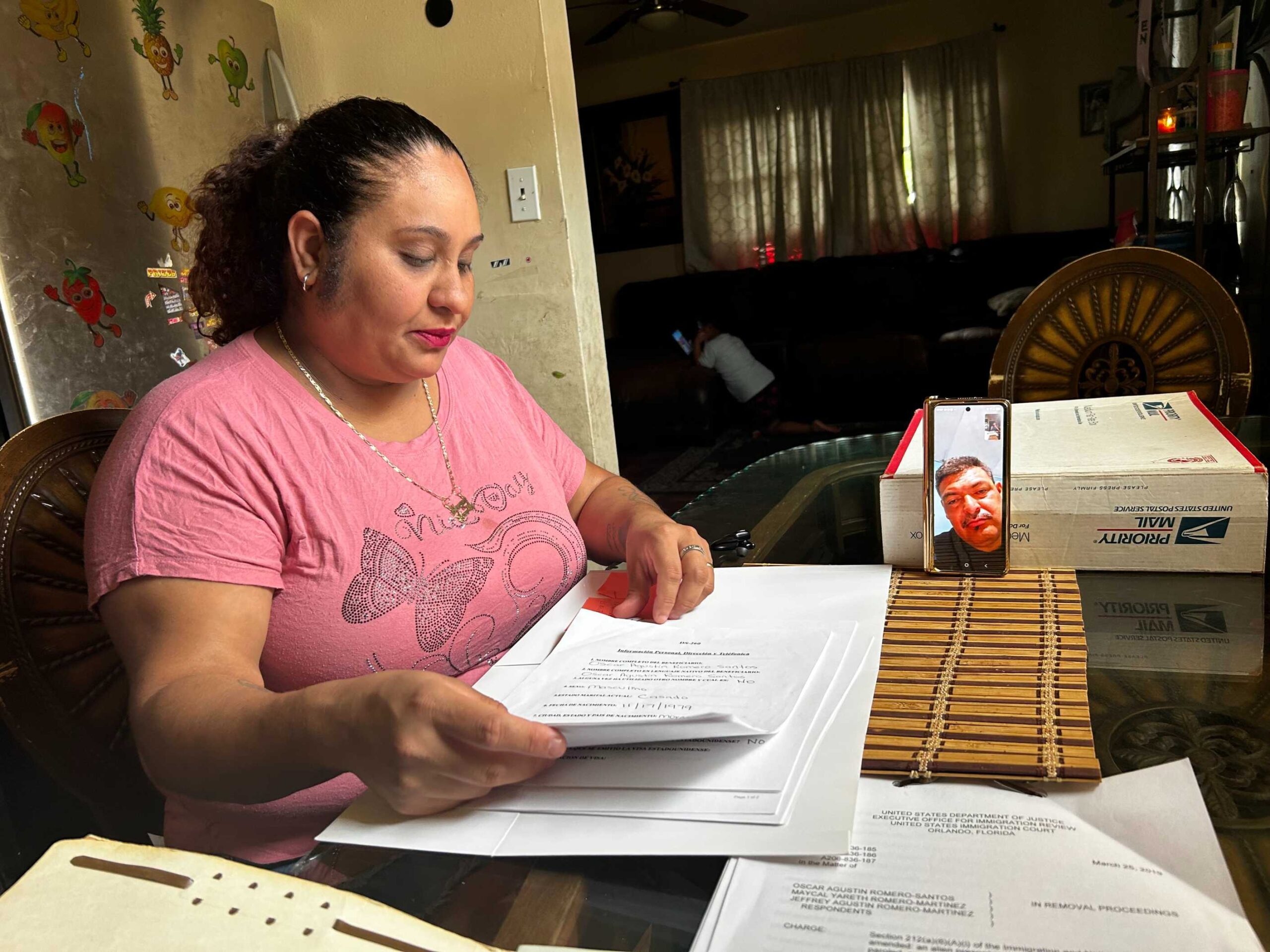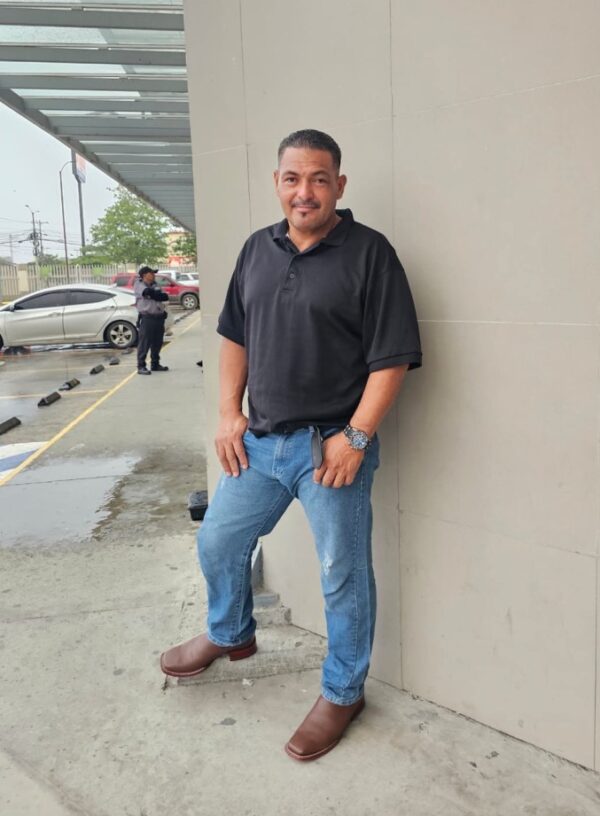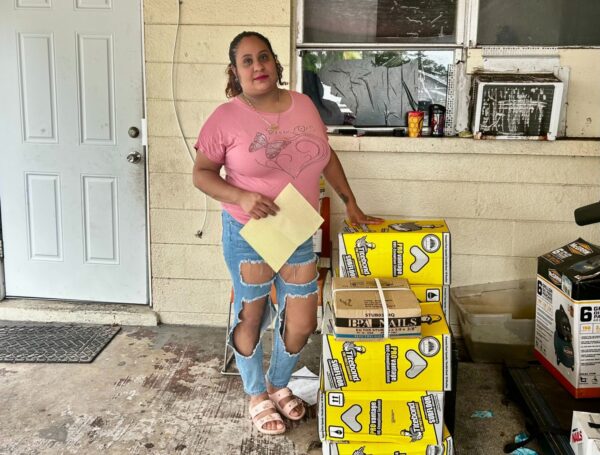
Sheysa Romero Santos sorted through her husband’s immigration paperwork, while the two chatted on FaceTime. | Photo by Alice Herman, Suncoast Searchlight
She paid his bond. ICE took him. Bradenton family’s saga shows how Florida jails fuel deportations
In the early morning hours on July 12, Oscar Romero Santos drove his red Ram truck toward the Bradenton home he shared with his wife. When he turned onto his block, a Manatee County Sheriff’s deputy followed.
As Romero Santos pulled into the driveway, the deputy flashed his emergency lights.
Romero Santos parked, got out of the truck and walked quickly towards the house, the 45-year-old later recounted in Spanish to Suncoast Searchlight.
“That’s when [the deputy] came running from the other side of the car and put handcuffs on me,” he said.
Inside, his wife Sheysa Romero Santos slept, unaware of what was transpiring on her doorstep — or that it would be the last time she’d be that close to her husband for the foreseeable future.
Only when Romero Santos called from the jail did his wife learn what had happened. She hustled to the courthouse and paid $650 to cover his bonds on misdemeanor charges of driving without a license and obstruction of justice without violence, believing it would bring him home.
Instead, Immigration and Customs Enforcement detained him and deported him to Honduras within weeks.
Romero Santos is one of thousands of immigrants whom ICE has taken into custody from local jails in Florida this year as it pursues President Donald Trump’s mass deportation goals. Many of these individuals, like Romero Santos, have not yet received a trial and are legally presumed innocent.
The stakes are high.
A simple traffic stop or low-level arrest can become a fast-track to deportation, separating families, disrupting jobs and businesses and leaving local court cases unresolved.
Suncoast Searchlight spent over a month analyzing local and national data to understand the scope of this practice. Reporters examined nationwide ICE records and local jail logs, and interviewed lawyers, advocates and an affected family. The findings show how routine arrests can trigger cascading consequences far beyond the original charge. Among the findings:
-
- In Florida, the jail-to-deportation pipeline is one of the main engines of Trump’s mass-deportation push. Routine arrests, even for minor charges, are a direct gateway into ICE custody — the most frequent method of immigration arrests in the state.
- The system overwhelmingly targets people without serious criminal records. Less than half of people apprehended by ICE in Florida and later deported had any criminal convictions, and of those who did, most were for nonviolent offenses.
- Some of the people deported never get their day in court. For those who are taken by ICE after paying their bond, local criminal cases remain unresolved. Those cases sometimes turn into bench warrants as defendants legally presumed innocent are unable to appear in court.
- The process creates a bureaucratic snarl for courts and lawyers. Once people are transferred between ICE facilities or deported, local courts and public defenders may lose track of them.
The system functions through a routine mechanism. After an arrest, sheriff’s departments share inmate information, including fingerprints, with federal agencies. ICE uses that data to identify people who may be undocumented, and issues a “detainer” or “hold” to the sheriff’s office.

If an ICE hold is in place when that person is scheduled for release — for example after completing time served or posting a bond — the sheriff’s office must hold them for an additional 48 hours. During that time, ICE agents can come to the jail to take individuals into custody on civil immigration charges.
This tactic allows the federal agency to “use jails like a dragnet to find people who are undocumented,” said Wanda Bertram, a communications strategist at the Prison Policy Initiative, a research and advocacy nonprofit focused on criminal justice reform.
“It’s kind of like shooting fish in a barrel for ICE.”
The practice is not new. Last year, under the Biden administration, ICE issued thousands of requests to Florida jails to hold inmates beyond their scheduled release.
But under Trump’s administration — and with an assist from state and local law enforcement — the use of jail holds has surged here, turning a longstanding bureaucratic tool into a key driver of mass-deportation strategy. The number of ICE detainers issued in Florida from Trump’s inauguration through the end of July jumped 142% above the same period last year, according to Suncoast Searchlight’s analysis of federal data published by the Deportation Data Project. Nationwide, ICE detainers increased by 65%.
“It hit me like a bucket of cold water,” said Sheysa Romero Santos, in Spanish, of her husband’s arrest and deportation. “Everything we built, I thought, had fallen apart.”
Get stories like this delivered to your inbox weekly: Sign up for the Suncoast Searchlight newsletter
A life built in Florida, undone in hours
For Romero Santos, immigrating to the United States was an option of last resort.
He crossed the U.S.-Mexico border in 2014 as an asylum-seeker. Gang members had extorted his family and killed his father and uncle, he later recounted in immigration court. Fear drove him from his home in San Pedro Sula, a city in the northwest corner of Honduras whose name has become synonymous with unchecked violence.

Oscar Romero Santos sought asylum in the U.S. and founded a construction company in Florida. He was deported to Honduras in July. | Photo courtesy of Sheysa Romero Santos
As his asylum case inched through the courts, Romero Santos rebuilt his life in the United States. He founded a construction company that specialized in siding and exteriors, and met his wife, Sheysa, who had moved to Florida from Puerto Rico a decade earlier. The couple settled in Bradenton and had two children, now 4 and 6 years old.
“He fought,” said Sheysa, who described her role as an “ama de casa,” a stay-at-home mother and housewife. “Just him, bit by bit, to buy his trucks, to buy his materials. He did that alone.”
When Romero Santos’ case came before a judge, the court found no reason to doubt his account. The court found that he had provided evidence of his family’s situation in Honduras, including death certificates for his father and uncle, records from a 2019 hearing show.
But it ultimately denied his asylum claim, ruling that his fears of crime and gang activity did not warrant such protections. An order was issued for his removal, and when Romero Santos appealed, the court denied that too, closing the case in 2022.
Instead of leaving the country, Romero Santos chose to remain. He had built a business, a home and a family here, and he feared returning to Honduras.
Then came the arrest this summer. In the probable cause affidavit, the arresting deputy wrote that he followed Romero Santos’ truck after noticing it drift into the opposing lane, initiated a stop as Romero Santos turned into his driveway and saw him try to open the door to his home despite repeated commands to stop.
Absent from the affidavit were Romero Santos’ shouts to his wife, for help she would not have been able to give.
Romero Santos was booked into Manatee County Jail and expected Sheysa’s bond payment to bring his release.
“She’d paid the bond — they charged her that bond to get me out,” Romero Santos said. “But later, when the other defendants were being released, they told me I couldn’t go … that I was being deported.”
He spoke with Suncoast Searchlight on Sept. 4 over FaceTime from his mother’s home in San Pedro Sula, about a month after his deportation. “It’s really difficult to be here. Really, really difficult,” he said.
More than a decade after he fled north, he said he still feels the threat of violence as so severe “you can’t even go out and about.”
While workplace raids have grabbed headlines amid Trump’s mass-deportation campaign, what happened to Romero Santos is much more common, Suncoast Searchlight’s data analysis shows. County jails are ICE’s primary feeder system nationally and in Florida. Since Trump’s inauguration on Jan. 20, the share of immigration arrests made this way in the Sunshine State alone has climbed to at least 42%. And the total number has more than tripled here compared with the same period last year.
It’s an increase Sarasota County Sheriff Kurt Hoffman has noticed.

“With the change of administrations in Washington, there’s been a higher percentage of those folks picked up,” Hoffman said. “All but maybe a few have been picked up” by ICE during their 48-hour hold.
Sarasota County has had the biggest surge in ICE detainers among Suncoast counties since Trump’s inauguration. From Jan. 20 through late July, ICE issued 173 detainers to Sarasota County jail, quadrupling the number issued in the same period last year.
At Affordable Bail Bonds in Sarasota, owner Brent Klein said he turns down potential clients when there’s an immigration hold involved. It’s a losing business move.
“My responsibility is for them to show up to court,” Klein said. “If I bond somebody out and then they get shipped to, like, Miami, to Krome, or they get shipped to [another] detention facility, they’re missing court. And the county wants the money, the bottom line. They can force me to pay the money … they won’t let me get off the bond.”
In the past, Klein said, defendants with immigration holds were not always picked up by ICE after paying a bond. Now, “it seems like nobody’s getting out.”
Deportations leave local court cases unresolved
Even when immigrants are deported, their local criminal cases — often stemming from minor charges such as driving without a license or failing to register their vehicle — do not simply disappear. Instead, they linger in the courts, consuming public resources and leaving families to wrestle with warrants and fines that can haunt defendants if they ever attempt to return to the United States.
Ed Brodsky, state attorney for the 12th Judicial Circuit, said that if his office learns “definitively” that a defendant has been deported, it may consider dismissing the local charges.
But while immigrants are held in detention, it’s not always clear whether they ultimately will be deported — or even where they are, a concern immigration attorneys and families have increasingly raised since Trump took office.
While they are shuffled through the immigration detention system, undocumented immigrants’ criminal cases may go into warrant status, Brodsky said.
“That way, if they do come back,” he said, “then they do have to face that charge.”
Most of those warrants stem from “very minor charges,” Brodsky said. People facing more serious charges are less likely to bond out and instead remain in jail to be prosecuted. In those instances, if found guilty, the defendant will serve a sentence before ICE can pursue them.
Brodsky said his office, which covers Sarasota, Manatee and DeSoto counties, has seen only occasional cases where a person is deported after a bond is paid for their release.
Suncoast Searchlight’s analysis found that more than a third of people who were deported since Jan. 20 after being apprehended by ICE in Florida had pending criminal cases.
![Hi your honor My name is Oscar A.Romero Santos,I writting this letter to you to inform you that i have an uncoming court day on August 20th 2025 for no driver's license and obstructions without violence and i was detained by immigration and i am no longer in the United States of America and i wanted to ask you if there is any way you can assigned me a public offender lawyer to see if there's any things they can help me on the 2 charges that i have.I just want to do the things right and not have a warrant in the future.Thank you so much for you time.If you have any questions please call this number [redacted] and you can speak with my wife.](https://suncoastsearchlight.org/wp-content/uploads/2025/09/Oscar-Romero-Santos-Letter-400x557.jpg)
A letter Oscar Romero Santos wrote to the judge overseeing his misdemeanor case in Manatee County. | Photo from Manatee County Court
In Romero Santos’ case, Manatee County Court set an arraignment for him for Aug. 20, more than two weeks after he had been deported to Honduras.
“It’s unjust,” said Sheysa, who scrambled to submit documentation of her husband’s deportation before his initial court date.
In a July letter to the judge overseeing Romero Santos’ case, Sheysa explained that ICE had taken her husband into custody and deported him from the country. “I don’t want him to have a warrant in the future is there any possible way you can dismiss the charge for him,” she wrote.
The couple submitted documentation of the five facilities ICE held him in before his deportation, and Romero Santos followed up with a letter of his own, imploring the court to assign him a public defender.
“I just want to do the things right and not have a warrant in the future,” he wrote. “Thank you so much for you[r] time.”
His charges have not been dismissed.
Instead, the court assigned Romero Santos’ case to the public defender’s office, which automatically entered “not guilty” pleas to both charges on Sept. 11.
The courts and immigration system have “made it near impossible for us to communicate with our client,” said Larry Eger, the public defender for the 12th Judicial Circuit, in an interview with Suncoast Searchlight. Eger pointed to the ICE records Romero Santos submitted to the court documenting the series of facilities where he was held across the South.
“The timeframe is unbelievable,” Eger said, referring to how ICE had shuttled Romero Santos from facility to facility. “Where is he? Is he in Louisiana? Is he in Georgia? Is he in Pinellas? Who knows?”
‘I have faith in God’
On a Thursday afternoon in early September, Sheysa sat in the kitchen of her family’s tidy three-bedroom house, a stack of papers and a cell phone on the table in front of her, ringing repeatedly.

After her husband was deported, Sheysa Romero Santos took over the family’s construction business. | Photo by Alice Herman, Suncoast Searchlight
“When they took him, I felt like I was going crazy,” Sheysa said. “I asked myself, ‘How am I going to pay for everything here, with my kids, me being alone? What am I going to do?’
“And I said, ‘Well, I’m going to move forward.’”
So, she took over her husband’s construction business. She manages orders for materials and transports them to the work sites in her truck. She fields calls from the company’s workers. And when they have questions she can’t answer, she calls Romero Santos for advice.
“Here we are, managing the business that I set up over there,” Romero Santos said via FaceTime. “We’ve been able to keep working, together, my wife and I.”
Reuniting the family is another, more painful question. One with less straightforward answers. The couple has hired an immigration attorney to help Romero Santos move back to the United States, but that process could take years. In the meantime, Sheysa and her kids are looking forward to Christmas in Honduras. She already bought plane tickets.
Romero Santos said he will not give up hope of returning to the country that he made his home.
“I have faith in God I’ll [return],” he said. “I have faith in God.”
Kara Newhouse is an investigative data reporter and Alice Herman is an investigative/watchdog reporter for Suncoast Searchlight, a nonprofit newsroom of the Community News Collaborative serving Sarasota, Manatee and DeSoto counties. Contact Kara at kara@suncoastsearchlight.org and Alice at alice@suncoastearchlight.org.
Get stories like this delivered to your inbox weekly: Sign up for the Suncoast Searchlight newsletter


